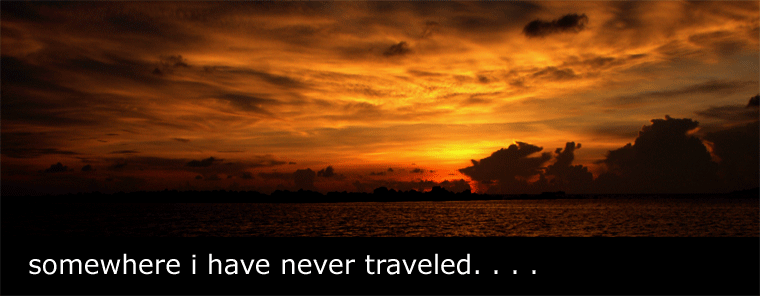Ano? Sino? ang Diyos?
Pinagsisikapan natin, sa ating katutubong pagmumuni-muni at isip, na humantong sa isang matinong pagkilala sa pag-iral at katotohanan ng Diyos. Marami ngang landas na maaring tahakin, ngunit pumuli tayo ng tatlo, at sa pamamagitan ng tatlong landas na ito— madalas man magkamali at madapa-- maaari nating makilala, sa pamamagitan ng ating isip at diwa, ang Diyos, “mula sa malayo.”
1. Diyos sa Proportio at Participatio. Sa pagtanaw at pagdanas sa pagmemeron ng lahat ng sanlinikha, nakikilala natin ang Diyos bilang siyang Mismong Meron na nagpapa-iral sa lahat lahat ng nagmemeron sa pamamagitan ng proportio at participatio. Tumutungo ang buong sangkameronan sa Kanyang kanila pinagmulan, at sabay sinasalamin Siya sa mahiwagang “paggaganito ng bawat nagmemeron.” Sabi nga ni Hopkins,
I say móre: the just man justices;
Kéeps gráce: thát keeps all his goings graces;
Acts in God’s eye what in God’s eye he is—
Chríst— for Christ plays in ten thousand places,
Lovely in limbs, and lovely in eyes not his
To the Father through the features of men’s faces.
2. Diyos na Siyang Nagpapameron. Nakikilala rin natin ang Diyos bilang may poder sa meron na siyang nagpapameron sa mga marupok na linalang na “maaaring hindi magmeron.” Ang Diyos na siyang lumalaban sa mismong kawalan upang pameronin ang bawat linalang sa bawat oras at sa bawat sandali. Sa ganitong paraan, masasabing nakabitin ang lahat sa kanya— sapagka't wala sa mga linikhang linalang ang kakayahan at poder sa meron. At ang kilos na ito ay kilos ng pag-ibig.
3. Diyos sa Kaayusan ng Lahat-lahat. Sa wakas, nakikita din natin, sa ating pagtanaw sa daigdig, ang isang malalim kaayusan na siyang tumuturo sa pag-iral ng isang makapangyarihang Diyos. Ang kaayusan na ito'y lampas sa anumang sistema ng agham o konsepto ng isipan, at sa isang tahimik na paraan-- kung makikinig lamang tayo-- nararamdaman natin ang lagda ng Diyos sa likod ng kaayusang ito. Kung kaya't kahit sa gitna ng nagmimistulang kaguluhan, may nananaig pa rin na mahiwagang kaayusan.
Ngunit sa tatlong landas na ito, tila meron pa ring kulang. Sapagka't hindi nga siguro sapat ang pag-iisip sa kung ano ang Diyos, at tila baga kay layo pa rin sa Kanyang tunay na katotohanan bilang Diyos ang pagbibigay sa Kanya ng mga pangalang “mismong meron,” “poder ng lahat-lahat” at “pinagmumulan ng kaayusan.” Tila baga hindi sapat tanungin kung ANO lamang ang Diyos, sapagka't kasabay ng pag-uunawa natin sa kung ano nga Siya, nakikilala natin na, kasabay ng mga katotohanang ito, ang Diyos ay personal, nakikipag-kapuwa sa atin, at para sa ating mga Kristiyano (at maging sa ibang mga relihiyon), minamahal tayo. Hindi nga wasto na alamin lamang ang kung “ano ang Diyos” na para bagang ito'y isang “Ano ang isang bato”. . . . sapagka't ang Diyos ay hindi lamang isang ANO, kung 'di isang SINO.
Tunay ngang personal ang tao— may ANO at SINO. Ano ang tao? Ganito. Sino ang tao? Siya. Ngayon, kung hindi personal ang Diyos, tila bagang humihigit ang tao sa Kanya. Ngunit nakita natin na ang tao ay puspos ng kahinaan. Kaya't halos napipilitan tayong aminin na personal ang Diyos. At totoo nga! Dahil mismong nararanasan natin ito— sa kanyang pagkilala sa Kanyang sarili, umuusbong ang lahat, maging ang pinakamunting butil ng buhangin!
Kaya nga naman ang Diyos ay matatawag nating Ama, kapatid, kaibigan, irog. Sapagka't ang Diyos ay nakikipag-ugnay sa atin sa isang malalim na paraan. Ngunit kasabay ng pagmamalapit na ito, umiiral din ang katotohanan na ang Diyos ay mismong Meron, Poder at Kaayusan. Siya na tinatawag kong ama o kaibigan ang siya ring lumikha ng sanlinikha!
Marahil, sa puntong ito, mabuting gamitin ang mga paniniwala si Santo Tomas de Aquino sa pangungsap at pagkilala sa Diyos. Sinasabi niyang sa tuwing sinasabi natin na Isa, Totoo at Mabuti ang Diyos, meron nga talaga tayong sinasabi ngunit sa paraang formaliter, eminenter at per negationem. Formaliter, sapagka't dahil sa ating pagbigkas sa kung ano o sino ang Diyos, mayroon tayong kakayahan na kilalanin Siya; na may sinasabi nga talaga tayong totoo. Ngunit kasabay nito, eminenter ang ating pagbigas, sapagka't ang katotohanang binibigkas natin tungkol sa Diyos ay lampas na lampas pa rin sa ating pag-uunawa. Kung kaya't sa pagkilala natin sa limitadong paraan ng ating pag-uunawa, sa gitna nitong apaw at lampas na katotohanan sa eminenter, hindi pa rin natin alam, at tila wala pa rin tayong nasabi. Kung kaya't naiiwan na lamang tayo sa pagbibigkas sa kung ano hindi ang Diyos, sa pamamagitan ng per negationem.
Sa katapusan ng lahat, namumulatan tayo na tunay ngang may kakayahan tayong dumating sa isang matinong pag-uunawa sa Diyos, ngunit alam nating kulang na kulang ito. Humahanap tayo ng mga salita at talinhaga upang maunawaan ang Kanyang katotohanan, at minsan ito'y nakakatulong. Kung dahil humaharap tayo sa isang hiwaga, hindi natin Siya lubos na natatarok. Ngunit malalapitan pa rin. Kaya't ang nararapat na tugon ay pagkukumbaba, pagkilala na “kapag nasabi na ang lahat ng masasabi, ang pinakamahalaga ay hindi masasabi.” Kaya nga siguro, si Santo Tomas, ang siyang sumulat ng malalalim na pagmumuni-muni tungkol sa katotohanan ng Diyos, ay bigla na lamang tumigil sa kanyang pagsusulat, at hindi na sumulat muli, nang, isang umaga, habang itinataas ang ostia habang nagmimisa, naunawaan niya na ang lahat ng kanyang naisulat at nakita ay anino lamang ng tunay na katotohanan ng Diyos. “Everything that I have written is straw,” ika niya.
Ngunit sa gitna ng pagkalitong ito, naghahanap pa rin tayo, at hinahanap rin Niya tayo. Marahil totoo nga ang sinasabi nila tungkol sa pag-uunawa sa Diyos— na para bagang pilit nating isinusuksok ang buong karagatan sa isang maliit na butas. Ngunit buong-giting at ligawa pa rin tayong nag-iigib, sabay nagpapabasa sa kahiwagahan ng Kanyang tubig-buhay.





